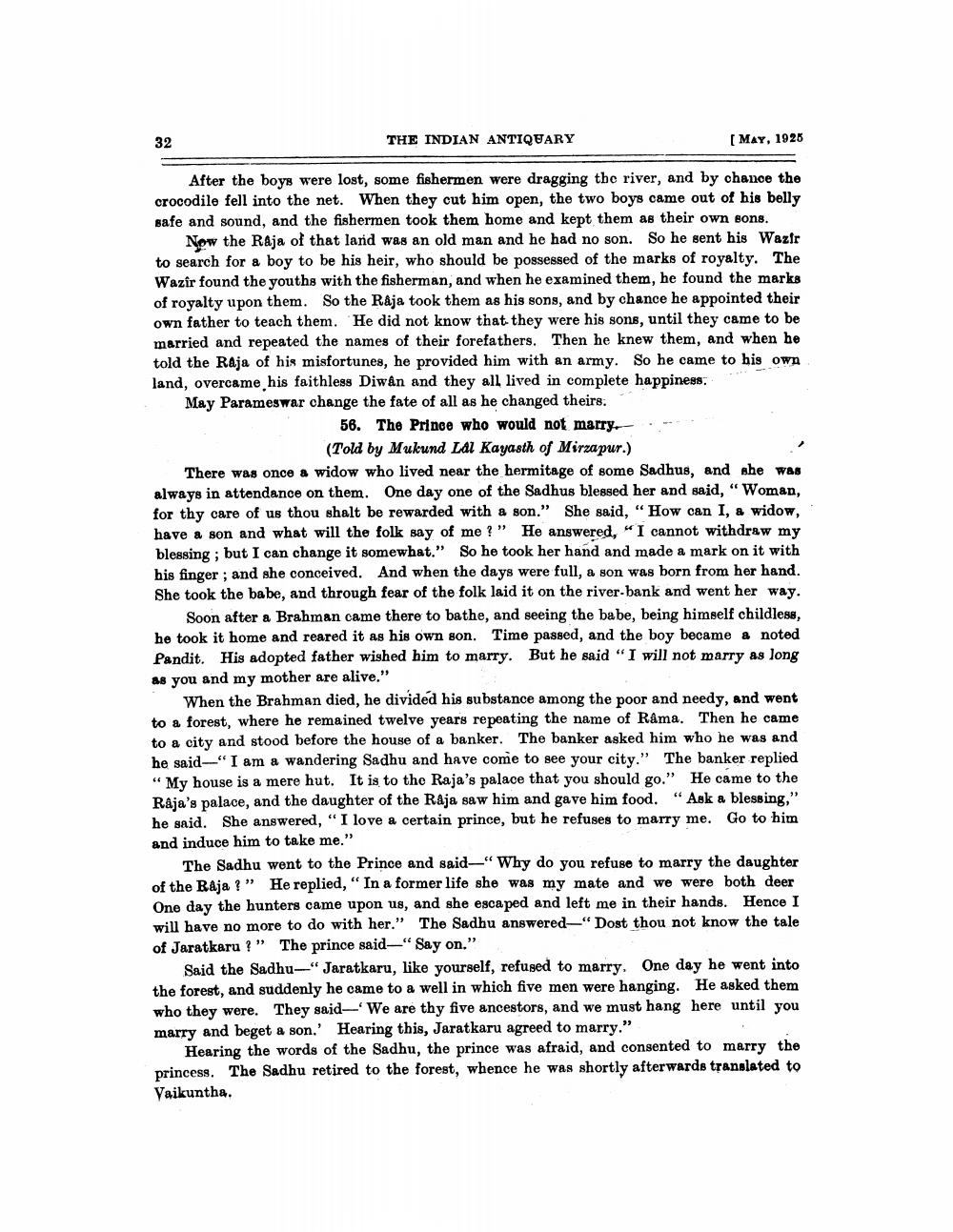________________
32
THE INDIAN ANTIQUARY
[ May, 1926
After the boys were lost, some fishermen were dragging the river, and by chance the crocodile fell into the net. When they cut him open, the two boys came out of his belly safe and sound, and the fishermen took them home and kept them as their own sons.
Now the Raja of that land was an old man and he had no son. So he sent his Wazir to search for a boy to be his heir, who should be possessed of the marks of royalty. The Wazîr found the youths with the fisherman, and when he examined them, he found the marks of royalty upon them. So the Raja took them as his sons, and by chance he appointed their own father to teach them. He did not know that they were his sons, until they came to be married and repeated the names of their forefathers. Then he knew them, and when he told the Raja of his misfortunes, he provided him with an army. So he came to his own land, overcame his faithless Diwan and they all lived in complete happiness May Parameswar change the fate of all as he changed theirs.
56. The Prince who would not marry. ..
(Told by Mukund Lal Kayasth of Mirzapur.) There was once a widow who lived near the hermitage of some Sadhus, and she was always in attendance on them. One day one of the Sadhus blessed her and said, "Woman. for thy care of us thou shalt be rewarded with a son.” She said, "How can I, a widow, have a son and what will the folk say of me?" He answered, "I cannot withdraw my blessing ; but I can change it somewhat." So he took her hand and made a mark on it with his finger ; and she conceived. And when the days were full, a son was born from her hand. She took the babe, and through fear of the folk laid it on the river-bank and went her way.
Soon after a Brahman came there to bathe, and seeing the babe, being himself childless, he took it home and reared it as his own son. Time passed, and the boy became a noted Pandit. His adopted father wished him to marry. But he said "I will not marry as long as you and my mother are alive."
When the Brahman died, he divided his substance among the poor and needy, and went to a forest, where he remained twelve years repeating the name of Rama. Then he came to a city and stood before the house of a banker. The banker asked him who he was and he said "I am a wandering Sadhu and have come to see your city." The banker replied "My house is a mere hut. It is to the Raja's palace that you should go." He came to the Raja's palace, and the daughter of the Raja saw him and gave him food. "Ask a blessing," he said. She answered, “I love a certain prince, but he refuses to marry me. Go to him and induce him to take me.”
The Sadhu went to the Prince and said-“Why do you refuse to marry the daughter of the Raja ?” He replied, “In a former life she was my mate and we were both deer One day the hunters came upon us, and she escaped and left me in their hands. Hence I will have no more to do with her.” The Sadhu answered—"Dost thou not know the tale of Jaratkaru ?" The prince said—“Say on."
Said the Sadhu-"Jaratkaru, like yourself, refused to marry. One day he went into the forest, and suddenly he came to a well in which five men were hanging. He asked them who they were. They said- We are thy five ancestors, and we must hang here until you marry and beget a son.' Hearing this, Jaratkaru agreed to marry."
Hearing the words of the Sadhu, the prince was afraid, and consented to marry the princess. The Sadhu retired to the forest, whence he was shortly afterwards translated to Vaikuntha.




